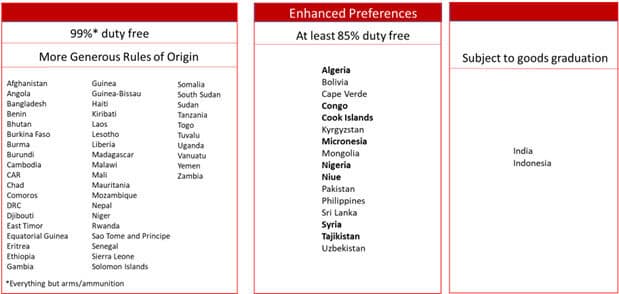Significant changes to trading with Developing Countries
Andrew Thurston · Posted on: June 6th 2023 · read

On 19th June 2023, the United Kingdom is introducing the new Developing Countries Trading Scheme, which is a significant change to how UK businesses will trade with Developing Countries.
Does your business trade with countries listed below?
If yes, then you may benefit from this new scheme. The MHA Customs team can help you to review the changes to tariffs and origin rules to ensure your business is ready.
The Benefits
DCTS will provide benefits to many businesses who trade with lesser developed countries by simplifying the rules of origin and reducing administrative burden. It will also allow the UK Government to monitor the human rights and labour rights standards within the listed countries to help increase the standard of living in developing countries.
The new agreement offers potential duty savings for businesses trading with the listed countries, so it is important to understand the changes and how these impact your business.
What is required of you?
We recommend that you review the rules of origin to establish any effects on the documentary evidence and duty liabilities within your supply chains.
More about the Scheme
This new scheme will replace the existing Generalised System of Preferences (GSP) scheme currently operating in the UK since it was still in the European Union. The legislation covering the DCTS is The Trade Preference Scheme (Developing Countries Trading Scheme) Regulations 2023 and The Customs (Origin of Chargeable Goods: Developing Countries Trading Scheme) Regulations 2023.
The DCTS has been designed to reduce import costs incurred by UK businesses (by up to £750m per year), admin costs and bureaucracy by simplifying Rules of Origin and increasing the scope of countries who can take advantage of the scheme. It will provide the following:
Least Developed Countries (LDCs): Duty-free, quota-free trade to on everything but arms
Lower Income Countries and Lower-middle Income Countries (LMICs): Duty-free, quota-free trade on 85% of eligible goods.
A total of 66 countries, as outlined below, are included in the DCTS on its introduction (48 countries in the GSP Least Developed Country (LDC) Framework and 18 additional countries or territories classified by the World Bank as low income (LIC) and lower-middle income (LMIC).

Customs Tariffs
As a result of a review of the existing tariffs employed under the GSP arrangements, the Government has announced that an additional 156 products will be subject to reduced or removed tariffs, such as Milk, Cheese, Garlic, Flour, Sugars and Petfood. The full list can be found here.
As part of the Enhanced Preferences, for specified LICs and LMICs, more than 85% of Tariff Codes will benefit from zero tariffs covering trade worth approximately £2 billion per annum.
The introduction of the DCTS means that, under the scheme, 99 per cent of goods imported from Africa could enter the United Kingdom duty free.
Seasonal Tariffs
Another key area, that was reviewed under the DCTS provisions, related to the seasonal tariffs applied to specific goods, such as citrus fruits, at certain times of the year. 11 of the 15 seasonal tariffs have been removed under the DCTS Standard Preferences. The 4 remaining are for cucumbers (0707005), globe artichokes (07099100), wilkings (08052900) and strawberries (08101000). The DCTS Enhanced Preferences will allow 0% on 15 seasonal tariffs.
Simplification of Rules of Origin:
Under the DCTS, there have been simplifications to the existing GSP Rules of Origin. The rules are provided in Schedule 1 of The Customs (Origin of Chargeable Goods: Developing Countries Trading Scheme) Regulations 2023.
Cumulation
As part of the changes within the DCTS, the cumulation measures are expanded to allow for the use of materials, that are duty-free and quota-free (when traded between the cumulating partner and the UK), from 95 countries.
This expansion will greatly benefit African LDCs as they will now be able to use goods sourced from fellow Economic Partnership Agreement (EPA) countries to produce qualifying goods.
This means that raw materials and components which, previously, meant the finished product couldn’t qualify as Originating, may now be included, therefore providing significant benefits to the LDC Exporter’s UK customers.
Get in touch
Our experienced customs experts are on hand to provide advice and assistance on these new regulations. Contact our team today.





